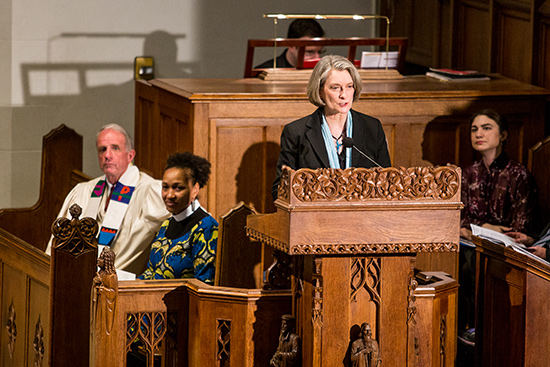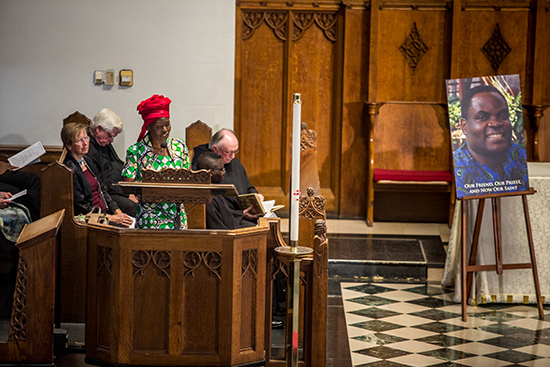STH Alum Remembered as Courageous Humanitarian
Father Vincent Machozi was shot to death by DRC soldiers

During a memorial service for Father Vincent Machozi at Marsh Chapel Tuesday, STH’s Dana Robert quoted from a note Machozi wrote her in 2007: “The project of my religious community is to initiate Congolese people in the mission of social transformation and peace building at the particular time of turmoil in the D.R. Congo.” Photos by Alexandra Wimley (COM’17)
Father Vincent Machozi, Catholic priest and humanitarian, who was murdered last month by soldiers of the Democratic Republic of the Congo (DRC) after he posted an online article denouncing the involvement of the Congolese and Rwandan presidents in the massacres of innocent civilians, was remembered Tuesday afternoon in a service at Marsh Chapel.
Friends, colleagues, and admirers of Machozi (STH’15) gathered to recount stories and celebrate his work in Boston and the DRC. To honor Machozi’s multicultural efforts, parts of the service were conducted in English, French, and Swahili.
The School of Theology hopes to endow a scholarship in his name, to be offered to one or more students from Africa attending the School of Theology, with preference for those committed to study and service focused on justice and peace, as well as a lecture to address the grassroots transformation of society.
A native of eastern Congo and a School of Theology student from 2006 to 2012, Machozi worked closely with the BU Pardee School of Global Studies African Studies Center on outreach efforts in the war-torn country. He was a priest with the religious order Augustinians of the Assumption (Assumptionists), and founder of the website Beni Lubero, whose purpose is to report on atrocities committed by all sides in the ongoing turmoil in the DRC. In 2012, Machozi put aside work on his PhD thesis, exploring the role of the Catholic Church in transforming the conflict in his country, in favor of human rights work, and despite previous death threats, returned to the Congo. He was awarded an STM (Master of Sacred Theology) degree in 2015.
John Hart, an STH professor of Christian ethics and one of Machozi’s thesis advisors, told those assembled to honor Machozi that the priest’s commitment to social justice and human rights drove him to return to his homeland. “He told me about current events in Congo,” said Hart. “He explained how a very valuable mineral, coltan, worth more than diamonds, could replace poverty with prosperity if it were shared by all Congolese people. But coltan lands were seized from their owners, who were murdered, mutilated, or enslaved in coltan mines—all to serve the greed of warlords and generals. Vincent lamented such poverty and suffering; it pierced his spirit profoundly.”
Dana Robert, Truman Collins Professor of World Christianity and History of Mission, and another of Machozi’s advisors, quoted from a note he wrote to her in 2007. “The project of my religious community is to initiate Congolese people in the mission of social transformation and peace building at the particular time of turmoil in the D.R. Congo,” Machozi wrote. “As a pastor in a rural parish in eastern Congo, I witness the need of having skills to address social, cultural, economic, and political issues when ministering to people displaced because of the ethnic conflict.”
On March 20, just days after Machozi posted an article implicating Joseph Kabila, DRC president, in the country’s violence, uniformed soldiers of the Armed Forces of the DRC stormed a social center in the North Kivu region, where Nande tribal chiefs were meeting to discuss peace efforts. The soldiers demanded to be taken to Machozi, and when they found him in a courtyard working on his laptop, they opened fire.
The International Rescue Committee estimates that since 2008, conflict-related causes have killed more than 5.4 million people in the DRC, most from starvation and disease, and the United Nations has described the region’s strife, largely from a scramble for mineral resources, as the deadliest conflict since World War II.

Ayda Zugay (CAS’10), who met Machozi at the African Studies Center and worked with him on his website, which deliberately posts disturbing images of people who have been brutally murdered, said she was skeptical about the priest’s mission initially.
“After all, I thought, how is it possible that nearly two million people—yes, two million, in France, Belgium, Canada, South Africa, Germany, Switzerland, Kenya, DRC, UK, the United States—could be viewing all of these images of violence and read these stories, yet still stand paralyzed and are not doing more?” she said. “The only reason I agreed to help him with his work initially was because I saw the pain it caused him and the urgency with which he appealed to me. For that reason, it didn’t matter whether it was true, but I realized very quickly that it was. As I uploaded the pictures and read the accounts on his phone, it because clear that Machozi had an army of journalists on his side who had hope because Machozi inspired them by his faith in God and in people, by his courage to stand up for what’s right, and by his undying activism.”
Fellow student and friend Shandirai Mawokomatanda (STH’16) recalled that he and Machozi would talk at great length about peace and reconciliation on the African continent. “I admired him for his courage and faith,” said Mawokomatanda. “I remember the conversation we had when he told me that he would be returning to the Congo even though he knew that there were threats against his life. He felt ever so strongly that he had to return. Because of this, I found in Vincent a truer witness of the Christian faith. Indeed, he lived into the Christian vocation ‘to deny oneself, take up one’s cross, and follow Jesus.’”
According to Machozi’s colleague Timothy Longman, a College of Arts & Sciences associate professor of political science and African Studies Center director, there had been at least seven earlier attempts on the priest’s life, and the political situation in the DRC is complicated, with government forces and various rebel groups fighting one another and terrorizing civilians with widespread slaughter and rape. New York Times columnist Nicholas Kristof has called eastern Congo “the rape capital of the world,” noting that in some areas of the region, as many as three quarters of the women have been raped.
Speaking at the memorial service, Longman said that for Machozi, human rights was the most important ministry. “The loss of Father Machozi leaves a deep wound,” he said. “But his life and work inspired others who will step up to continue his ministry of fighting oppression and saving lives. His Beni Lubero website continues its work of documenting atrocities, including posting photos of Machozi’s own desecrated body.
“Father Machozi’s life may be over, but his spirit and his ministry live on.”
Father Malumba Matsongani, a fellow Assumptionist and a student of Machozi’s, told the mourners that Machozi was murdered in his own village two weeks before his 51st birthday. “His merciless killers foolishly think that he is dead, with his soul and idea or project for justice and peace,” Matsongani said. “But the truth is, you can’t kill an idea with a bullet.”
All are invited to share their memories of Father Vincent Machozi here.
Watch a video of Father Vincent Machozi’s funeral in the Democratic Republic of Congo here.
Watch a video of Father Vincent Machozi’s memorial service at Marsh Chapel here.

Comments & Discussion
Boston University moderates comments to facilitate an informed, substantive, civil conversation. Abusive, profane, self-promotional, misleading, incoherent or off-topic comments will be rejected. Moderators are staffed during regular business hours (EST) and can only accept comments written in English. Statistics or facts must include a citation or a link to the citation.